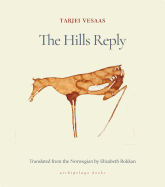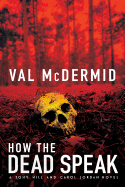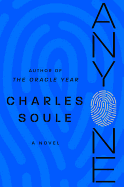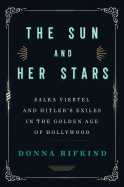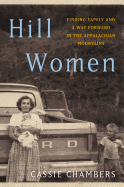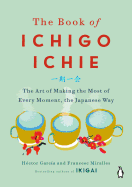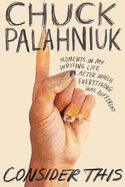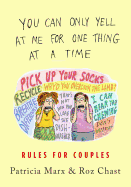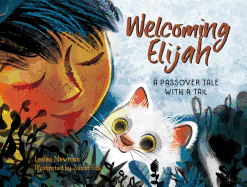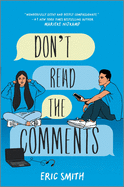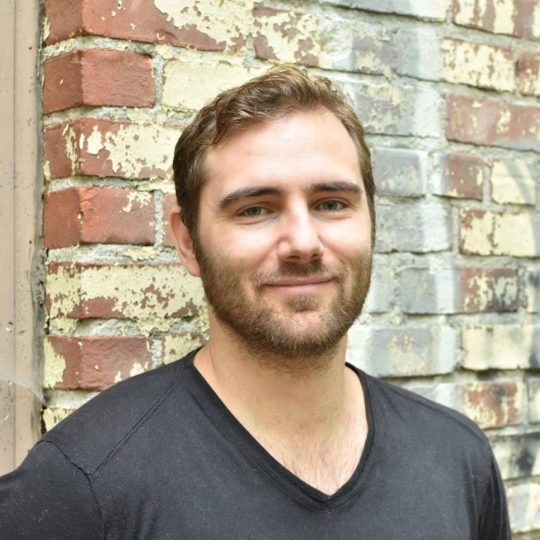 |
| (photo: Ali Unal) |
Andrew David MacDonald grew up in Edmonton, Alberta. He won a Western Magazine Award for Fiction and was shortlisted for the Canadian National Magazine Award for Fiction. His work has been anthologized in four volumes of The Journey Prize Stories, which collects the year's best Canadian stories by emerging writers. He has an MFA from the Program for Poets and Writers at the University of Massachusetts, Amherst, and lives in Southwestern Ontario. When We Were Vikings, his first novel, will be published by Scout Press in January 2020.
When We Were Vikings is such a well-crafted, perfectly paced novel. How did this story evolve for you as a writer?
The novel grew out of a short story, though it was written from the perspective of the character who would eventually evolve into Gert. At the time I thought I was writing about people I didn't know. A couple years after I finished the story, I realized that Gert's resentment about sacrificing aspects of his own life to take care of Zelda mirrored my own resentment towards a family member whom my brother and I had to take care of, in many respects, when we were teenagers.
I tend not to write about my own life, at least not explicitly, so it was surprising to see much of my internal world reflected in a story that initially seemed so foreign. From there, I started wondering about Zelda and Gert. Were they any closer to achieving their hopes and dreams, to finding love and acceptance out there in the world? From the bits and pieces I wrote to try and answer those questions, Zelda's voice started coming through. Eventually those bits and pieces became When We Were Vikings.
Zelda seems to transcend the page and feels completely real, like someone the reader actually knows. Tell us about the process of writing her and developing her voice. How did she come to life for you?
It seems to me that a person's idiom oftentimes reflects aspects of their personality. With that in mind, I set about discovering Zelda's private languages: the idiom she uses with members of her tribe, the terms and linguistic quirks, as well as the manner in which Viking culture becomes a way for her to understand a world that can be, at times, just beyond her understanding. My hope is that, in learning to speak and take part in Zelda's language, readers will likewise feel like members of her tribe.
As the title suggests, Vikings are a particular obsession of Zelda's. Did you share her fascination before writing this novel? Or did you need to research them?
Zelda's fascination with Viking culture grew organically. I had no idea when I first met her that she would become so immersed in it and, by extension, that it would become one of my interests. The research part was similarly organic; I started with a base understanding of the Vikings, which probably didn't extend much beyond that of the average person, and I began learning in real time along with Zelda. Coincidentally, well after the first draft was written, the remains of a female Viking warrior were discovered--which of course I had to include in the novel.
Your novel has been compared to Mark Haddon's The Curious Incident of the Dog in the Night-Time and The Silver Linings Playbook by Matthew Quick. How do you feel about those comparisons?
I hadn't read Haddon's novel before I wrote the first draft of Vikings, since I wanted to let Zelda come to life without another idiosyncratic narrative voice slipping in. But having read the book and loved it, I am flattered by the comparisons! As for Silver Linings Playbook, I adored both the book and the movie. I appreciate the way Quick explores bleaker aspects of the human condition with vulnerability and open heartedness.
Zelda has Fetal Alcohol Spectrum Disorder (FASD), a condition that we really don't hear much about. Why did you choose for her to have FASD?
It isn't as widely publicized as similar conditions, even though an estimated 500 babies are born each year with FASD in my home province of Alberta, Canada. Moreover, I grew up around a lot of substance abuse and had a close friend whose sister was on the Fetal Alcohol Syndrome spectrum. As such, the ramifications of alcohol abuse weren't foreign to me or the people around me. All of which is to say: it felt right.
One of the subplots of the novel is Zelda's relationship with her boyfriend, Marxy, and their intention to take the next step in their relationship. For some people, the idea of people with disabilities having sexual feelings is completely foreign. Tell us why you wanted to show this very real, very "normal" side of Zelda and Marxy.
I'd like to start by saying that everyone struggles with sexual intimacy, especially if it's a new experience. One thing I came to understand about Zelda and the other characters in the book is that, despite what can feel like a cultural obsession with labels, we are all confused and stumbling souls who do our best to navigate an incredibly complicated, confusing, at times hostile world.
Along with people with disabilities having intimate relationships, you also show another reality: someone responsible for a sibling with a disability. Tell us about the decision to include that storyline with Gert and Zelda.
I mentioned my own experience having to care for a family member, which probably covers the "why." But more broadly, I don't think it's much of a spoiler to note that, while Gert is ostensibly not the one with the "disability," over the course of the novel we see that at times Zelda comes to take care of him. Other characters similarly step in and out of the caretaking role. Thinking about my own life and the people in it, I can see a similar give and take, and I have a hunch that that's more universal than meets the eye.
One of the themes in the book is the idea of protecting the tribe. Zelda and Gert don't have what some might consider a traditional family arrangement--and even when they did, it was dysfunctional. Could "protecting the tribe" also be interpreted as permission to create your own family with others who aren't blood relatives?
Yes, absolutely! I remember struggling with something similar when I left home. I had no idea that the white picket fence families that existed on TV could be found out there in the world, and while my family will always be family, I think that, like Zelda, the number of "good eggs" who have become part of my tribe are too numerous to list (though I did try in the acknowledgments page of my book!).
While I was reading, I could see this as a movie so vividly. Have there been any discussions about a potential film?
Ah! A debut novelist can dream. As far as I know, Zelda and her tribe are swimming Hollywood's winding channels, looking for a dock at which to port.
This is your debut novel. Tell our readers a little bit about yourself as a writer.
I started out as a jock who was a closet writer and have morphed into a closet jock who writes. John Irving's The World According to Garp was the first book to make me cry--and not just because, like Garp, I was a wrestler who started writing to impress a girl.
I write very early in the morning, in an apartment with no Internet and a geriatric tuxedo cat who yells at a tennis ball she pushes endlessly across the carpet. Whether I'm working on a short story or a new novel (in progress!), my deepest hope is to affect readers the way Garp affected me. If I can do that, then I'm a happy, content camper. --Melissa Firman
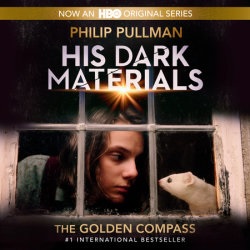 While listening to the full-cast audio production of The Golden Compass (Listening Library, $44)--this time on CDs--with Philip Pullman himself as narrator, along with an extraordinary group of actors, I missed my turnoff to Jerry Spinelli's house. I was scheduled to interview the Newbery-winning author for a feature. (Luckily, I had built in an extra hour.) You might think the moral of the story is: Don't listen while driving!
While listening to the full-cast audio production of The Golden Compass (Listening Library, $44)--this time on CDs--with Philip Pullman himself as narrator, along with an extraordinary group of actors, I missed my turnoff to Jerry Spinelli's house. I was scheduled to interview the Newbery-winning author for a feature. (Luckily, I had built in an extra hour.) You might think the moral of the story is: Don't listen while driving!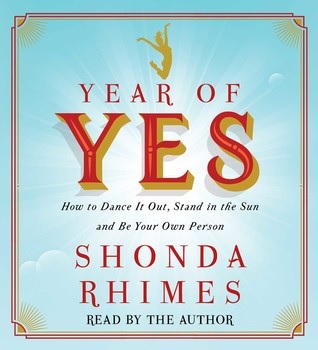 On the contrary, audiobooks enrich my daily drives, now that I've left Manhattan for rural New Jersey. My car stereo recognizes my phone instantly and resumes where I left off. Shonda Rhimes's Year of Yes (Simon & Schuster Audio, $29.99) inspired me to rethink what I say "Yes" to and what I say "No" to in a whole new way. I also got to listen to her speeches--live.
On the contrary, audiobooks enrich my daily drives, now that I've left Manhattan for rural New Jersey. My car stereo recognizes my phone instantly and resumes where I left off. Shonda Rhimes's Year of Yes (Simon & Schuster Audio, $29.99) inspired me to rethink what I say "Yes" to and what I say "No" to in a whole new way. I also got to listen to her speeches--live.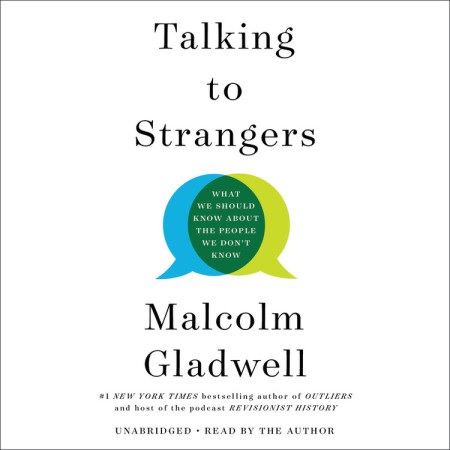 Then came Malcolm Gladwell's Talking to Strangers (Hachette Audio, $40); snippets of his interviews offered another dimension to his examples of being misled by our own assumptions--how could that authoritative-sounding FBI agent have been so wrong about one of his subordinates?
Then came Malcolm Gladwell's Talking to Strangers (Hachette Audio, $40); snippets of his interviews offered another dimension to his examples of being misled by our own assumptions--how could that authoritative-sounding FBI agent have been so wrong about one of his subordinates?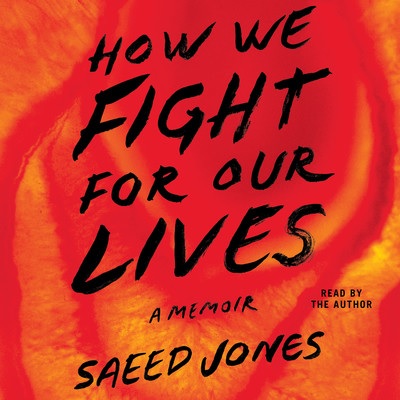 Now I'm listening to Saeed Jones tell his own story in How We Fight for Our Lives (Simon & Schuster Audio, $29.99). Just try to stop listening after that opening meditation about his mother--a roller-coaster of emotion that sets us up for the entire ride. Hear, hear!
Now I'm listening to Saeed Jones tell his own story in How We Fight for Our Lives (Simon & Schuster Audio, $29.99). Just try to stop listening after that opening meditation about his mother--a roller-coaster of emotion that sets us up for the entire ride. Hear, hear! 


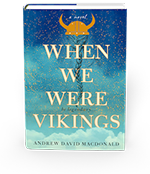



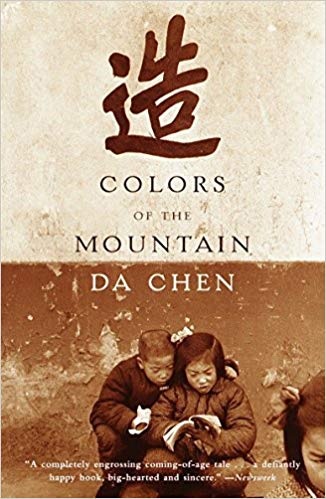 Chinese author Da Chen, whose family was persecuted during China's Cultural Revolution, died December 17 at age 57. His wife, Dr. Sun-Ling Chen, told the
Chinese author Da Chen, whose family was persecuted during China's Cultural Revolution, died December 17 at age 57. His wife, Dr. Sun-Ling Chen, told the 